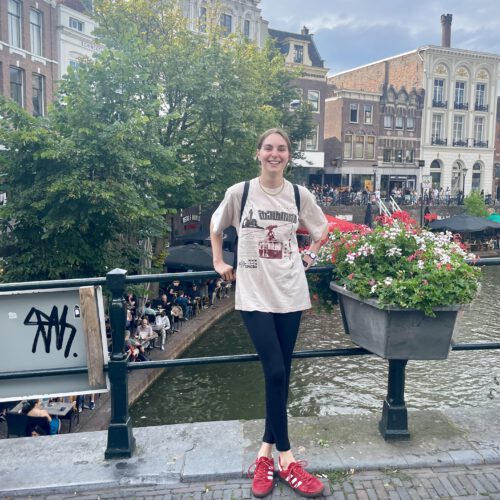
Mariam is 25 years old and from Georgia
BA Social Sciences, Free University of Tbilisi Master of Social Psychology, Ilia State University
Her main interests are:
Personality Development (Lifespan Perspective), Identity, Psychological Well-Being, Aging, Psychosomatics
You can reach her out on LinkedIn
What inspired you to pursue the IDA Master program?
I’ve always been interested in personality psychology and have wanted to dive deeper into the individual differences between people and how these differences impact various areas of our lives. At the same time, I wanted to learn more about the methodological aspects of research in this field and improve my research skills. I believe the IDA program offers a great balance of both.
What motivates you to pursue this field of study, and what personal significance or purpose do you find in it?
While I’m very interested in understanding the unique ways individuals think, process emotions, and navigate their environments, I’m also committed to applying this theoretical knowledge for practical purposes, such as developing effective interventions that can improve individuals’ lives.
Which field do you see yourself pursuing after completing the program? (For example, academia, research, the private sector, or corporate work)
This is a question I often think about 🙂 but I don’t have a clear answer yet. What I do know, though, is that I’m enjoying the process right now, so I’m considering continuing to a PhD.
Looking at the program schedule, which course(s) are you most excited about and why?
For now I’d say the first-year paper and traineeships are what I’m most excited about. They provide a great opportunity to dive deeper into the topics we’re interested in, to learn and apply new methods in practice, and work individually with professors, which is a different experience compared to the regular courses.
Do you ever feel stressed or under pressure in your studies? How do you manage those challenges? Would you like to share some tips?
I do, but I enjoy studying the things we cover, which definitely helps, and sometimes it’s energizing to be actively involved in something you’re interested in. However, there are limits, of course 🙂 I’m learning how to balance it, and what really helps in my case is sharing experiences with my coursemates. I also make time to talk to my friends back home, go for walks, work out, and fully disconnect from study topics by spending time in different environments from time to time.
What motivates you to keep going when things get tough?
I wouldn’t say my motivation has decreased, I’m still very interested in the topics we study. It’s just that when I get too tired, I start questioning everything 🙂 So, I’d recommend everyone to learn to rest when they’re feeling exhausted. Additionally, it’s important to reflect on and appreciate the progress you’ve made.
How do you see the skills and knowledge from the IDA Master being applied in the real world?
There are many important skills this program helps us develop, such as proactivity, critical thinking, collaboration, giving and receiving feedback, time and work management, communication, and the ability to articulate our thoughts clearly and coherently. These skills are valuable in all areas of life, especially today, when information and distractions are endless.
What do you enjoy most about collaborating with your peers, supervisors, or being part of the IDA community?
I really appreciate that my peers are supportive and open to collaborating and helping each other. I think it creates a great atmosphere in the group.
How would you describe your relationship with the faculty in the IDA program? How does this influence your overall learning experience?
Casual, friendly and professional – I love having the opportunity to work with different supervisors and communicate with them casually. I really appreciate their willingness and enthusiasm to discuss various topics and share their knowledge.
How would you describe an “IDA Student”? What common qualities do they share, and who do you think is best suited for this program?
I would say curious, enthusiastic about learning new things, open to new experiences, and proactive.
Is there anything you wish you had known before starting that would have made your journey smoother, and what advice (or tip) would you give to someone just beginning the program?
The experiences shared by other students and friends, whether from Tilburg University or elsewhere, including their challenges and insights, have been very helpful for me.






Be First to Comment